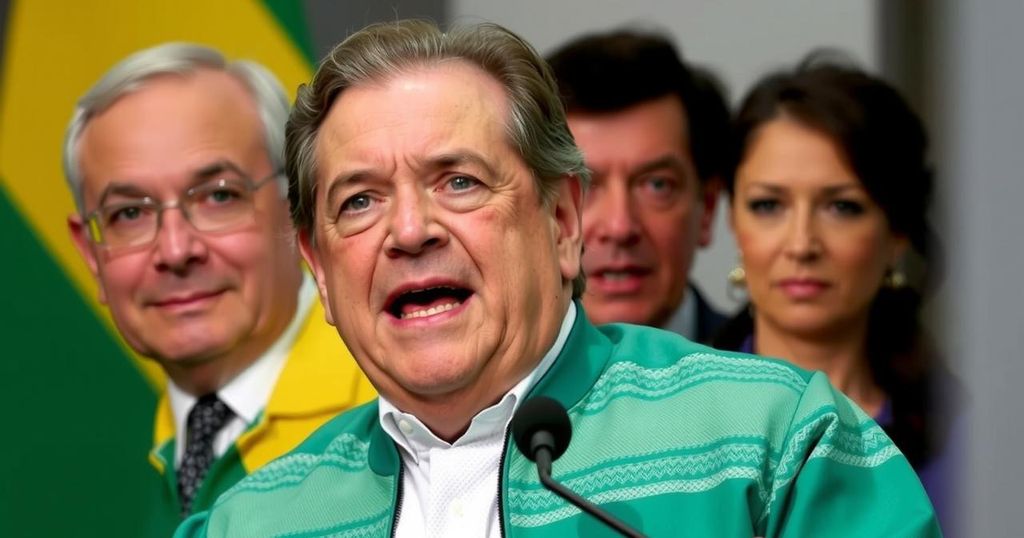World news
ANDRES MANUEL LOPEZ OBRADOR, ASIA, ASSOCIATED PRESS, BOLIVIA, CONSTITUTIONAL COURT, CORRUPTION, CUBA, DEMOCRACY, EL SALVADOR, ELECTIONS, EV, EVO MORALES, GOVERNANCE, LATIN AMERICA, LOPEZ OBRADOR, LUIS ARCE, MEXICO, NORTH AMERICA, PHILIPPINES, SOUTH AMERICA, THE ASSOCIATED PRESS
David O'Sullivan
0 Comments
Bolivia’s Judicial Elections Highlight Political Turmoil and Public Discontent
Bolivia is set to hold controversial judicial elections, the only of their kind globally, with significant public apathy evident in voter sentiment. The elections have become increasingly politicized, leading many to question their legitimacy. Amidst a power struggle between President Arce and former President Morales, the elections, postponed due to political motivations, reflect deep concerns about the integrity of Bolivia’s judiciary. Experts and voters alike are wary of the impacts of this electoral process on democracy.
In Bolivia, campaigning for the judicial elections slated for Sunday is prohibited, yet candidates have found creative ways to promote themselves, such as placing their images on snack packages. Bolivia is unique in the world for its elections concerning judicial appointments, a practice that other nations are starting to consider, as highlighted by Mexico’s recent judicial reforms. Despite the intent to foster democracy and eliminate corruption, many Bolivians feel disillusioned, perceiving the judicial elections as political contests rather than legitimate processes based on merit.
The elections have shifted the perception of the judiciary in Bolivia from independent mediators to politically influenced entities. As a consequence, citizens express skepticism about participating, with some resorting to random methods, such as coin flips, for their decisions. The system of electing judges—implemented over a decade ago—has faced criticism from political analysts and legal experts who argue that it undermines important judicial functions. The vice president of Bolivia’s electoral tribunal, Francisco Vargas, noted the increasing complexities and controversies surrounding the election process.
The context of these elections is complicated by the power struggle between current President Luis Arce and former President Evo Morales, particularly over control of the Constitutional Court. The Election was delayed unexpectedly by the court, a decision that raised concerns among observers about political manipulation and the integrity of the judicial system itself. Experts have expressed that such delays threaten the effectiveness of Bolivia’s judiciary, reinforcing perceptions of bias among judges.
As the nation prepares for this critical vote, only a partial election will occur, as only a fraction of the Constitutional Court’s positions are available. This discontent reflects the broader dissatisfaction with previous elections, where many voters chose to submit blank or null ballots in protest against perceived lack of choice and transparency. This disillusionment dates back to Morales’ controversial direct appeals to the electorate regarding his own presidential term limits, which ultimately led to civil unrest and his resignation in 2019.
With the evolving judicial landscape in Bolivia, Mexico is closely observing the implications of this electoral exercise as it navigates its judicial overhaul. As this election approaches, it remains to be seen whether it will bolster confidence in the judiciary or further polarize Bolivian society and politics.
Bolivia’s unique practice of holding elections for top judicial positions has sparked controversy and debate. This system, instituted over ten years ago, replaced a more traditional nomination process based on qualifications and expertise with a public voting mechanism. Critics have argued that this shift has politicized the judiciary, transforming judges into political pawns rather than impartial arbiters of the law. Current events indicate significant power struggles within Bolivia’s political landscape, particularly between President Luis Arce and former President Evo Morales, which have further complicated the judicial election process. Meanwhile, other countries, including Mexico, are observing these developments, particularly as they embark on similar electoral changes to their judicial system.
The upcoming judicial elections in Bolivia underscore the ongoing challenges within the nation’s political framework. With a history of judicial politicization and public disillusionment with the electoral process, the perceptions of these elections as political contests persist. The backdrop of political rivalry and the recent postponement of elections have raised critical questions about the future of Bolivia’s judiciary and its role in maintaining democratic integrity. As Latin America watches closely, the outcome of this election may have far-reaching implications for both Bolivia and neighbouring nations considering similar reforms.
Original Source: www.voanews.com




Post Comment